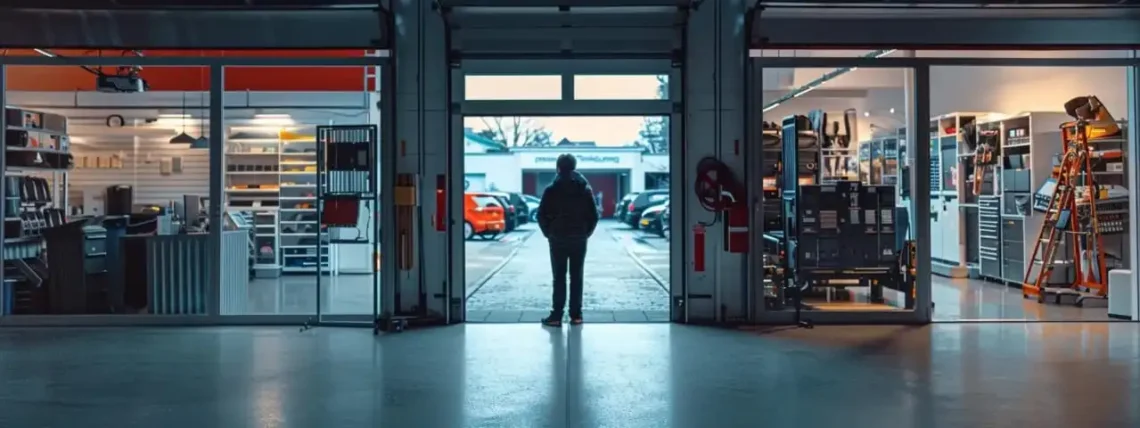
How To Select the Best Garage Door Opener for Your Needs?
Table of Contents
ToggleThe Ultimate Guide to Selecting the Perfect Garage Door Opener for Your Needs
Selecting the best garage door opener is critical to ensure convenience, safety, and durability. With technological advancements, the choices available today are more varied and sophisticated than ever before. To make the right choice, it’s important to consider factors like power, noise level, and additional features that cater to your specific requirements. Below, we will delve into the vital considerations to keep in mind while shopping for a garage door opener. Keep reading to learn how to make an informed decision.
Why Choosing the Right Garage Door Opener Matters
A garage door opener does more than open and close your garage. It impacts:
-
Security: Protects against unauthorized access.
-
Convenience: Enables remote and app-based access.
-
Noise levels: Especially important for attached garages.
-
Durability: Long-term investment with minimal maintenance.
-
Compatibility: Must match your door type and weight.
Understanding the Different Types of Garage Door Openers![]()
When choosing a garage door opener, it helps to know the main types: chain-drive, belt-drive, screw-drive, and direct-drive. Chain-drive models are strong and great for heavy doors, while belt-drive openers run quietly, perfect for garages near living areas. Screw-drive openers need less maintenance due to fewer moving parts, but may not handle extreme temperatures well. Direct-drive units are the simplest, offering smooth and quiet operation.
Climate can affect how well certain openers work, so consider your local weather before deciding. Trusted brands like Liftmaster offer reliable options across all these types, combining quality and performance to suit different garage door needs. Picking the right opener means matching your door, noise preferences, and environment for the best fit.
The Importance of Horsepower in Garage Door Openers
The horsepower of a garage door opener is crucial for its performance and longevity. Standard doors require about 1/2 HP, while oversized, heavy, or double-wide doors require 3/4 HP or more. A powerful motor ensures smooth operation and extends the opener’s life. More horsepower doesn’t always mean better quality.
The efficiency of the opener depends on the design of its mechanical parts and construction quality. It’s essential to find a balance between horsepower and quality components for top performance. Opting for the highest horsepower may be unnecessary, but understanding the power needed relative to your door’s specifications can save you from overspending while still providing the opener’s durability and functionality.
Analyzing the Drive Types for Smooth and Quiet Operation
The drive type of your garage door opener significantly impacts its noise level and smoothness of operation. Chain-drive openers are noisy and not ideal for garages below a bedroom or living area. Belt-drive openers have a rubber belt that reduces noise, making them popular for attached garages.
Screw-drive openers balance cost and noise levels, while direct-drive models have only one moving part. Belt-drive systems may require less maintenance due to smoother operation and fewer vibrations. Some direct-drive models come with lifetime warranties, ensuring peace of mind. Speed is another factor to consider, with some models offering faster opening and closing speeds. Safety should not be compromised for speed.
Considering Smart Features and Security Enhancements![]()
Smart garage door openers are becoming increasingly important in today’s digital age, offering remote control and monitoring through smartphone apps. Modern systems offer features like automatic door closure, alerts for open doors, and the ability to open or close for guests or deliveries.
Security enhancements like rolling code technology and timed locks, alarm systems, and strong encryption between remotes and the main unit are also crucial. Battery backup systems during power outages and integration with home automation systems can further enhance home security. Smart features can potentially increase home value, but it’s essential to ensure compatibility with your home network and user-friendly features.
Evaluating Warranty and Installation Services for Long-Term Satisfaction
When purchasing a garage door opener, consider the warranty, which can range from a few years to a lifetime on certain parts. Read the fine print to understand the warranty’s terms and consider the manufacturer’s reputation. Professional installation can save money and frustration in the long run, as it ensures proper setup and operation.
Some companies offer installation services at an additional charge or include it in the purchase price. A well-installed opener will function better and last longer, contributing to overall satisfaction. Don’t neglect the company’s support services, especially when dealing with high-tech features or troubleshooting.
Altogether, selecting the right garage door opener involves a careful examination of the types, horsepower, drive systems, and smart features, balanced with warranty and installation considerations. By meticulously evaluating these factors, you can choose an opener that not only meets your current needs but also serves you dependably for years to come.
Installation: DIY or Professional?
DIY Installation
Pros:
-
Saves money
-
Ideal for tech-savvy homeowners
Cons:
-
Time-consuming
-
Risk of misalignment or safety issues
Professional Installation
Pros:
-
Correct setup with warranties
-
Safety checks and door balancing included
Cons:
-
Additional cost
Tip: If your garage door system is old or needs rewiring, hire a professional.
Maintenance Tips for Long-Term Efficiency
-
Lubricate moving parts every 6 months.
-
Check for loose bolts and tighten them regularly.
-
Test the auto-reverse safety feature monthly.
-
Keep sensors clean and aligned.
-
Replace batteries in remotes and backup systems as needed.
FAQs – How to Select the Best Garage Door Opener
Q1: What’s the quietest type of garage door opener?
A: Belt drive and direct drive openers are the quietest. Ideal for attached garages near bedrooms or living rooms.
Q2: Do I need a smart garage door opener?
A: While not essential, smart openers offer convenience like remote access, alerts, and integration with home automation.
Q3: Can I install a garage door opener on my own?
A: Yes, many models come with DIY instructions. However, if you’re unsure about wiring or safety, hire a professional.
Q4: How long do garage door openers last?
A: Typically, they last between 10 to 15 years with proper maintenance.
Q5: Is battery backup really necessary?
A: Yes, especially if you live in areas with frequent outages. It ensures the door operates even without electricity.
You May Also Like

Top 10 Best Home Decor Stores in Cleveland, Ohio
18 December 2023
Top 10 Best Home Decor Stores in Fayetteville, North Carolina
12 February 2024

